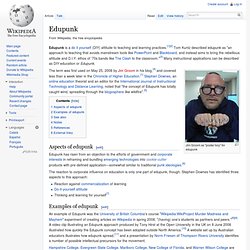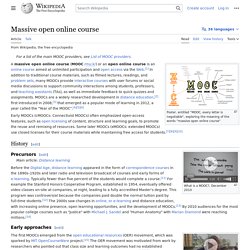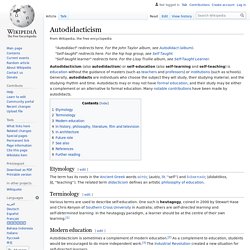

Other. History & Mystery. Languages. Math & Science. Learning Sites and Tools. Learn Ideas and Tips. Skills. Info Books. Not My Trees. Information. School. Edupunk. Edupunk is a do it yourself (DIY) attitude to teaching and learning practices.[1][2] Tom Kuntz described edupunk as "an approach to teaching that avoids mainstream tools like PowerPoint and Blackboard, and instead aims to bring the rebellious attitude and D.I.Y. ethos of ’70s bands like The Clash to the classroom.

"[3] Many instructional applications can be described as DIY education or Edupunk. Jim Groom as "poster boy" for edupunk The term was first used on May 25, 2008 by Jim Groom in his blog,[4] and covered less than a week later in the Chronicle of Higher Education.[1] Stephen Downes, an online education theorist and an editor for the International Journal of Instructional Technology and Distance Learning, noted that "the concept of Edupunk has totally caught wind, spreading through the blogosphere like wildfire".[5] Aspects of edupunk[edit] The reaction to corporate influence on education is only one part of edupunk, though. Massive open online course.
Poster, entitled "MOOC, every letter is negotiable", exploring the meaning of the words "Massive Open Online Course" A massive open online course (MOOC /muːk/) is an online course aimed at unlimited participation and open access via the web.[1] In addition to traditional course materials such as filmed lectures, readings, and problem sets, many MOOCs provide interactive user forums to support community interactions among students, professors, and teaching assistants (TAs).

MOOCs are a recent and widely researched development in distance education which were first introduced in 2006 and emerged as a popular mode of learning in 2012.[2][3] Early MOOCs often emphasized open-access features, such as open licensing of content, structure and learning goals, to promote the reuse and remixing of resources. Some later MOOCs use closed licenses for their course materials while maintaining free access for students.[4][5][6][7] History[edit] What is a MOOC?
Precursors[edit] Early approaches[edit] Autodidacticism. Independent education without the guidance of masters Autodidacticism (also autodidactism) or self-education (also self-learning and self-teaching) is education without the guidance of masters (such as teachers and professors) or institutions (such as schools).

Generally, autodidacts are individuals who choose the subject they will study, their studying material, and the studying rhythm and time. Autodidacts may or may not have formal education, and their study may be either a complement or an alternative to formal education. Many notable contributions have been made by autodidacts. Etymology[edit] The term has its roots in the Ancient Greek words αὐτός (autós, lit. Terminology[edit] Various terms are used to describe self-education.